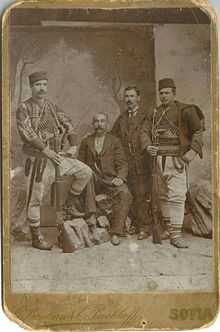Mirche Atsev
| Mirche Atsev | |
|---|---|
 Atsev (standing in left) with comrades in Sofia. | |
| Born |
1859 Oreovec, today Republic of Macedonia |
| Died |
1901 Ulanci, today Republic of Macedonia |
| Organization | IMARO |
Mirche Atsev, or Mirče Acev, nicknamed Orovchanets, was a Bulgarian revolutionary from Ottoman Macedonia, a leader of an Internal Macedonian-Adrianople Revolutionary Organization (IMARO) revolutionary band.[1] In the Republic of Macedonia he is considered Ethnic Macedonian.[2]
Biography

Mirche Atsev was born in 1859 in the village of Oreovec in the Prilep district, then part of the Ottoman Empire. He was named after his father, Mirche Atsev, who was a well-known voyvoda. He schooled himself in Prilep and then he worked as a shepherd. After Turks murdered his father, he joined the Hayduk's band of Kone Pavlov in 1885. Houever, in the next year, he was arrested and imprisoned in Solun. After having escaped from the prison, Atsev moved to Bulgaria. During his stay in Sofia, he was accused of involvement in the murder of Stefan Stambolov, as a result of which he was imprisoned for three years in the Black Mosque, (now Sveti Sedmochislenitsi Church). In Sofia, together with his brothers Petar and Georgi, he joined the revolutionary activity of the IMARO against the Turkish authorities. In 1899, Atsev entered with a revolutionary band into Ottomn Macedonia, in the region of Nevrokop. Later, he was a voyvoda in the region in Prilep. In 1901, on the way to the village of Ulanci, in the Tikveš region, his band was chased and crushed by a Turkish military detachment. Mirche Atsev died in this battle.
The Yugoslav partisan Mirče Acev was a nephew of Mirche Atsev, on his brothers' side.
References
- ↑ Izvestia, Volume 25, Institute for History (Bulgarian Academy of Sciences) 1981, p. 251.
- ↑ During the 20th century, Slavo Macedonian national feeling has shifted. At the beginning of the 20th century, Slavic patriots in Macedonia felt a strong attachment to Macedonia as a multi-ethnic homeland. They imagined a Macedonian community uniting themselves with non-Slavic Macedonians... Most of these Macedonian Slavs also saw themselves as Bulgarians. By the middle of the 20th. century, however Macedonian patriots began to see Macedonian and Bulgarian loyalties as mutually exclusive. Regional Macedonian nationalism had become ethnic Macedonian nationalism... This transformation shows that the content of collective loyalties can shift: Region, Regional Identity and Regionalism in Southeastern Europe, Ethnologia Balkanica Series, Klaus Roth, Ulf Brunnbauer, LIT Verlag Münster, 2010, ISBN 3825813878, p. 127.
Sources
- Енциклопедия България, том 1, Издателство на БАН, София, 1978.
- Кратка биография на Мирче Ацев